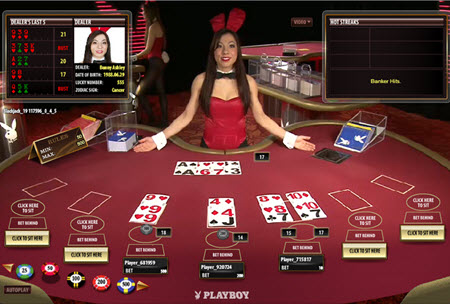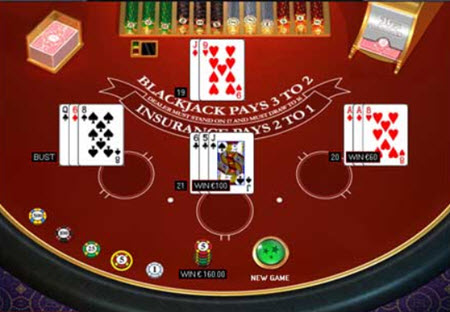Black Jack
On this page:
What kind of game is Black Jack?
Black Jack is a card game. You play against the house, not against the other players.
What kind of card deck is used?
Black Jack uses the standard (French) 52 card deck.
No jokers or other wild cards are used in standard Black Jack.
How many decks are used?
Single Deck Black Jack uses only one deck, but finding this game in casinos is quite rare. Black Jack played with six or eight decks is much more common.
What are the cards worth?
| Card | Point value |
| Ace | 1 or 11 points, depending on what’s best for the hand |
| Duce | 2 points |
| Tree | 3 points |
| Four | 4 points |
| Five | 5 points |
| Six | 6 points |
| Seven | 7 points |
| Eight | 8 points |
| Nine | 9 points |
| Ten | 10 points |
| Jack | 10 points |
| Queen | 10 points |
| King | 10 points |
The suits are of no importance when playing standard Black Jack.
How do I win at Black Jack?
You win by getting a hand that is higher than the dealer’s hand.
The best possible hand is a hand comprised of an ace + a 10 point card.
The second best is any other hand worth 21 points.
How do I play Black Jack?
 Make a bet.
Make a bet.- The dealer will give you two cards, both face up.
- Let the dealer know if you want to stay or if you want a third card. If your hand is worth 12 points or more, taking a third card is always a bit risky, because a hand that goes over 21 points is automatically forfeited together with the bet. On the other hand, if you stay with a low hand, such as a 12 point hand, the risk is fairly high that the dealer will get a better hand than you and you will lose your money that way.You are allowed to continue to ask for and get additional cards until the hand reaches 21 points or more.
- When all the players have made decisions about their hands, the dealer will reveal her own two-card hand. What happens next depends on the value of her two-card hand. Unlike a player, the dealer is not allowed to make decisions about her hand. She must follow strict rules about when to stay and when to take a card.In most casinos, the dealer will stay on a soft 17 or higher. If the hand is worth less than this, she will take a card (or more, if necessary to reach the treshold).
- If the dealer goes over 21 points, all player hands that are still in the game will get paid regardless of how low they are. This is one of the features that make Black Jack such an interesting game; sometimes staying at 12 points turn out to be exactly the right decision!If the dealer doesn’t go over 21 points, only hands that are better than her hand will get paid. Hands that are lower will lose their bet. How a tie is dealt with vary from one casino to the next. In some casinos, you simply keep your bet when there is a tie between your hand and the dealer’s hand. In other casinos, you lose your bet if there is a tie below 20 points.
What’s the difference between a soft hand and a hard hand?
A soft hand contains an ace that can count as 1 or 11 without the hand exceeding 21 points.
Example: Ace + 7. This is a soft hand, because the ace can be either 1 (1 + 7 = 8) or 11 (11 + 7 = 18). If you decide to stop here, the ace will count as 11 since that is best for the hand. If you take another card, that card will determine what the ace will count as. If you for instance get a 2, the ace will still count as 11, since 11 + 7 + 2 = 20 points. If you get a 5 instead, the ace will count as 1, because 11 + 7 + 5 = 23 points that would cause you to forfeit the hand. So, the value of the hand would be 1 + 7 + 5 = 13 points.
How much will I get paid when I win?
Each casino set their own payment rules, but it is very common to pay 1:1 on winning hands, with the exception of winning Black Jacks (ace + 10 point cards) where the standard payment is 3:2.
Examples:
- Your bet is $200, your hand is 20 points and the dealer’s hand is 18 points. You get paid $200 and have $400 in front of you.
- Your bet is $200, your hand is ace + queen and the dealer’s hand is 20 points. You get paid $300 and have $500 in front of you.
Novelty payments
Some Black Jack tables have special novelty payouts for certain hands, such as 7-7-7, a Black Jack formed by ace of spades + jack of spades, or any hand that contains at least five cards without going over 21 points.
What is splitting?
 The exact rules for splitting a hand varies from one casino to the next, so it’s a good idea to check before you start playing. Below, you will find a set of rules adhered to in many, but certainly not all, casinos.
The exact rules for splitting a hand varies from one casino to the next, so it’s a good idea to check before you start playing. Below, you will find a set of rules adhered to in many, but certainly not all, casinos.
- If you first two cards are of identical value, you are allowed to split them, forming two hands.
- If you elect to split a hand, you must make a new bet of exactly the same size as your original bet.
- A split hand turn into two separate hands, that you play just like normal hands.
Example: You bet €20. Your starting hand consists of a Ten and a Queen. Since both are worth 10 points, you are allowed to split them. You elect to split them and therefore make an additional €20 bet. The dealer separates the Ten from the Queen and place a new card from the deck by the Ten to form a new starting hand. You then play that hand just as you would a normal hand. When you have finnished making decisions about that hand, the dealer places a new card form the deck by the Queen and you play that hand just like you would a normal hand.
- Some casinos allow splitting a hand that has already been split. Let’s say that in the example above, the new card placed by the Ten turned out to be a King. You decide to split again, making an additional €20 bet. You will now have three hands to handle.
- If your starting hand is Ace + Ace you are allowed to split it, but special rules apply: you only get one (1) new card on each Ace. (In some casinos, you are however allowed to split again if the new card is another Ace.)
What is doubling?
Many casinos will allow you to double your bet if your starting hand is within the 7 – 11 point span. If you elect to double your bet, you will only get one more card on that hand.
What is insurance?
Insurance is a type of sidebet that will pay if the dealer gets a Black Jack.
At the start of each round of black jack, the dealer will show one of the cards that will constitute her hand. If that card is an ace, she will offer the players to buy insurance. If you buy insurance and the dealer gets a blackjack, you get paid; in most casinos, the payment is 2:1. If you buy insurance and the dealer doesn’t get a blackjack, you lose the money you paid for the insurance. Thus, insurance can be caracterized as a sidebet.
What’s the cost?
If you want to buy insurance for a hand, the price is equivalent to exactly 50% of your wager on that hand. So, if you wish to buy insurance for a hand where you have wagered €10, you have to put another €5 on the table.
Is Black Jack a game of pure luck?
No, there is a skill element to Black Jack since the player makes decisions about their hand during the round.
 Make a bet.
Make a bet.